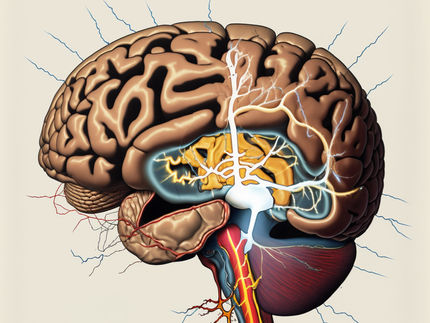"Cocaine kills brain": consequences of drug use for brain health
Cocaine quintuples the risk of stroke and accelerates brain ageing
Advertisement
cocaine use has increased significantly in Germany. The risks of this drug are hardly known, but they are dramatic, especially with regard to the health of the brain and nervous system: cocaine increases the risk of stroke fivefold, and regular use causes the brain to age more quickly. The apparent "brain enhancer" often leads to mental derangement in the long term.
Drugs "manipulate" the brain. They release messenger substances that initially trigger a sense of well-being and thus lead to addiction. Various mechanisms in the brain ensure that the craving becomes ever greater, while at the same time the importance of other things such as relationships, friendships, hobbies or work decreases. "Drugs turn us into zombies, we are controlled by others and lose ourselves as human beings, our own being becomes subordinate to the drug," says neurologist and psychologist Prof. Dr. Frank Erbguth, President of the German Brain Foundation. "This can be explained by the drug-related increase in neurotransmitters in the brain - e.g. dopamine, which fires up the 'reward center'. It gets used to the high concentrations and wants more and more 'stuff' - that's where the addiction begins." However, drugs not only pave the way to addiction in the brain, they also cause a lot of other damage there - hallucinations, agitation, psychosis and paranoia are known side effects and consequences.
However, it is largely unknown that the use of cocaine can also lead to serious neurological diseases in the long term, which the German Brain Foundation and the German Society of Neurology are urgently pointing out on World Drug Day, especially as cocaine use has increased significantly in Germany.
Cocaine quintuples the risk of strokes and cerebral haemorrhages
Two years ago, a systematic meta-analysis of 36 studies showed that the use of cocaine increases the risk of cerebral hemorrhage and ischemic stroke fivefold [1]. "A stroke usually only occurs in the second half of life. In current epidemiological studies [2], however, we see that the stroke rate of younger people under the age of 50 has risen, possibly due to the fact that significantly more cocaine is consumed in Germany," explains Prof. Dr. Peter Berlit, DGN Secretary General. Another finding of the meta-analysis: strokes caused by cocaine use are more often fatal (OR: 1.77) and are more frequently associated with complications such as vasospasms (OR: 2.25) and epileptic seizures (OR: 1.61).
Cocaine-induced vascular changes are significant, as the drug impairs vascular function and leads to constriction and inflammation of the blood vessels (vasoconstriction and vasculitis). This not only causes the headaches typical of addiction, but also appears to be a reason for the increased stroke rate of cocaine addicts [3].
The white powder leads to the breakdown of gray matter: This is how cocaine catalyzes brain aging
Another consequence of regular cocaine use is particularly far-reaching: cocaine accelerates the ageing process of the brain by changing the brain structure. A study published in 2023 [4] compared the brain tissue of cocaine addicts and non-users. An extensive atrophy of the gray matter in the temporal lobe, frontal lobe, insula and limbic lobe was found in the addicts. This atrophy of nerve cells is a typical sign of so-called neurodegenerative diseases such as Alzheimer's or Parkinson's - and also led to a higher "brain age" in cocaine addicts.
As early as 2012, a working group investigated the question of why long-term cocaine addicts exhibit limitations in terms of memory performance, attention and reaction time and carried out an imaging study [6]. This study also showed a faster decline in gray matter, with the rate of decline twice as fast as in healthy people. The brain scans of 30- and 40-year-old cocaine users show the same pathological changes as those of over 60-year-olds without a drug problem.
"The perfidious thing is that cocaine is often snorted by people who want to increase their cognitive performance. The drug does indeed have a short-term effect here, but in the long term you pay it back twice and three times over in the same currency. According to a survey [5], even occasional cocaine use could be associated with cognitive deficits. However, very few users are aware of this risk, and it is important to raise awareness," emphasizes Erbguth on the occasion of the upcoming World Drug Day on 26 June.
[1] Rendon LF, Malta S, Leung J, Badenes R, Nozari A, Bilotta F. Cocaine and Ischemic or Hemorrhagic Stroke: A Systematic Review and Meta-Analysis of Clinical Evidence. J Clin Med. 2023 Aug 10;12(16):5207. doi: 10.3390/jcm12165207. PMID: 37629248; PMCID: PMC10455873.
[2] GBD 2021 Stroke Risk Factor Collaborators. Global, regional, and national burden of stroke and its risk factors, 1990-2021: a systematic analysis for the Global Burden of Disease Study 2021. Lancet Neurol. 2024 Oct;23(10):973-1003. doi: 10.1016/S1474-4422(24)00369-7. PMID: 39304265.
[3] Farooque U, Okorie N, Kataria S, Shah SF, Bollampally VC. Cocaine-Induced Headache: A Review of Pathogenesis, Presentation, Diagnosis, and Management. Cureus. 2020 Aug 30;12(8):e10128. doi: 10.7759/cureus.10128. PMID: 33005542; PMCID: PMC7524019.
[4] Beheshti I. Cocaine Destroys Gray Matter Brain Cells and Accelerates Brain Aging. Biology (Basel). 2023 May 21;12(5):752. doi: 10.3390/biology12050752. PMID: 37237564; PMCID: PMC10215125.
[5] Ersche KD, Jones PS, Williams GB, Robbins TW, Bullmore ET. Cocaine dependence: a fast-track for brain ageing? Mol Psychiatry. 2013 Feb;18(2):134-5. doi: 10.1038/mp.2012.31. Epub 2012 Apr 24. PMID: 22525488; PMCID: PMC3664785.
[6] Soar K, Mason C, Potton A, Dawkins L. Neuropsychological effects associated with recreational cocaine use. Psychopharmacology (Berl). 2012 Aug;222(4):633-43. doi: 10.1007/s00213-012-2666-4. Epub 2012 Feb 29. PMID: 22374254.
Note: This article has been translated using a computer system without human intervention. LUMITOS offers these automatic translations to present a wider range of current news. Since this article has been translated with automatic translation, it is possible that it contains errors in vocabulary, syntax or grammar. The original article in German can be found here.

























































